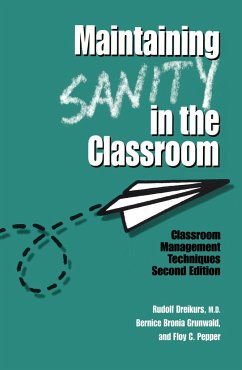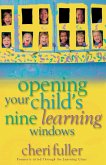Rudolf Dreikurs, Bernice Bronia Grunwald, Floy C. Pepper
Maintaining Sanity In The Classroom
Classroom Management Techniques
Rudolf Dreikurs, Bernice Bronia Grunwald, Floy C. Pepper
Maintaining Sanity In The Classroom
Classroom Management Techniques
- Gebundenes Buch
- Merkliste
- Auf die Merkliste
- Bewerten Bewerten
- Teilen
- Produkt teilen
- Produkterinnerung
- Produkterinnerung
A step-by-step guide to handling behaviour difficulties. This second edition includes new chapters on the family atmosphere, learning disabilities, the adolescent as opposed to the teenager, and the delinquent child. It features charts on the sociogram and a chart on student seating arrangements.
Andere Kunden interessierten sich auch für
![Training Teachers in Emotional Intelligence Training Teachers in Emotional Intelligence]() Elena SavinaTraining Teachers in Emotional Intelligence168,99 €
Elena SavinaTraining Teachers in Emotional Intelligence168,99 €![L. S. Vygotsky and English in Education and the Language Arts L. S. Vygotsky and English in Education and the Language Arts]() Peter SmagorinskyL. S. Vygotsky and English in Education and the Language Arts172,99 €
Peter SmagorinskyL. S. Vygotsky and English in Education and the Language Arts172,99 €![Creating Wicked Students Creating Wicked Students]() Paul HanstedtCreating Wicked Students169,99 €
Paul HanstedtCreating Wicked Students169,99 €![Working with Boys Working with Boys]() Andrew HamptonWorking with Boys149,99 €
Andrew HamptonWorking with Boys149,99 €![The Opening Your Child's Nine Learning Windows The Opening Your Child's Nine Learning Windows]() Cheri FullerThe Opening Your Child's Nine Learning Windows21,99 €
Cheri FullerThe Opening Your Child's Nine Learning Windows21,99 €![The Role of Prior Beliefs Refutational Text Intrinsic and Extrinsic Goals and Extrinsic Reward Structure in the Conceptual Change of Preservice Teachers The Role of Prior Beliefs Refutational Text Intrinsic and Extrinsic Goals and Extrinsic Reward Structure in the Conceptual Change of Preservice Teachers]() Dawn KutzaThe Role of Prior Beliefs Refutational Text Intrinsic and Extrinsic Goals and Extrinsic Reward Structure in the Conceptual Change of Preservice Teachers83,99 €
Dawn KutzaThe Role of Prior Beliefs Refutational Text Intrinsic and Extrinsic Goals and Extrinsic Reward Structure in the Conceptual Change of Preservice Teachers83,99 €![Supporting Students' Motivation Supporting Students' Motivation]() Johnmarshall ReeveSupporting Students' Motivation167,99 €
Johnmarshall ReeveSupporting Students' Motivation167,99 €-
-
-
A step-by-step guide to handling behaviour difficulties. This second edition includes new chapters on the family atmosphere, learning disabilities, the adolescent as opposed to the teenager, and the delinquent child. It features charts on the sociogram and a chart on student seating arrangements.
Produktdetails
- Produktdetails
- Verlag: Taylor & Francis
- 2. Auflage
- Seitenzahl: 368
- Erscheinungstermin: 24. November 2015
- Englisch
- Abmessung: 235mm x 157mm x 24mm
- Gewicht: 683g
- ISBN-13: 9781138168008
- ISBN-10: 1138168009
- Artikelnr.: 44315253
- Herstellerkennzeichnung
- Libri GmbH
- Europaallee 1
- 36244 Bad Hersfeld
- gpsr@libri.de
- Verlag: Taylor & Francis
- 2. Auflage
- Seitenzahl: 368
- Erscheinungstermin: 24. November 2015
- Englisch
- Abmessung: 235mm x 157mm x 24mm
- Gewicht: 683g
- ISBN-13: 9781138168008
- ISBN-10: 1138168009
- Artikelnr.: 44315253
- Herstellerkennzeichnung
- Libri GmbH
- Europaallee 1
- 36244 Bad Hersfeld
- gpsr@libri.de
Rudolf Dreikurs
Foreward. Preface. I. Theoretical Premises. 1. Development of the Child's
Potential. 2. Goal Directed Behavior. 3. The Four Mistaken Goals. 4.
Private Logic: A Diagnostic Technique for Understanding Behavior. 5.
Changing the Child's Goals. 6. The Family Atmosphere. 7. The Family
Constellation. II. Effective Democratic Methods. 8. The Democratic versus
the Traditional Classroom. 9. Discipline and Order. 10. Winning over the
Child. 11. Encouragement. 12. Logical Consequences Versus Arbitrary
Punishment. 13. The Structure of the Group. 14. Group Discussions in the
Classroom. 15. Specific Techniques: Group Discussions. 16. Training
Children to Understand Behavior Through the Use of Stories. III. Coping
with Special Academic Problems. 17. Learning Disabilities. 18. Reading
Difficulties. 19. Culturally Deprived Children. 20. Pseudoretardation
Reffered to as Stupidity. 21. Gifted Children and Homogeneous Grouping. 22.
I.Q. Tests. IV. Coping with Special Behavior Problems. 23. The Adolescent.
24. Juvenile Delinquency. 25. Stealing. 26 Lying and Swearing. 27.
Fighting. V. Parental Involvement. 28. Parent-Teacher Conferences. 29. The
Family Council. 30. Parent Education. Epilogue. Index.
Potential. 2. Goal Directed Behavior. 3. The Four Mistaken Goals. 4.
Private Logic: A Diagnostic Technique for Understanding Behavior. 5.
Changing the Child's Goals. 6. The Family Atmosphere. 7. The Family
Constellation. II. Effective Democratic Methods. 8. The Democratic versus
the Traditional Classroom. 9. Discipline and Order. 10. Winning over the
Child. 11. Encouragement. 12. Logical Consequences Versus Arbitrary
Punishment. 13. The Structure of the Group. 14. Group Discussions in the
Classroom. 15. Specific Techniques: Group Discussions. 16. Training
Children to Understand Behavior Through the Use of Stories. III. Coping
with Special Academic Problems. 17. Learning Disabilities. 18. Reading
Difficulties. 19. Culturally Deprived Children. 20. Pseudoretardation
Reffered to as Stupidity. 21. Gifted Children and Homogeneous Grouping. 22.
I.Q. Tests. IV. Coping with Special Behavior Problems. 23. The Adolescent.
24. Juvenile Delinquency. 25. Stealing. 26 Lying and Swearing. 27.
Fighting. V. Parental Involvement. 28. Parent-Teacher Conferences. 29. The
Family Council. 30. Parent Education. Epilogue. Index.
Foreward. Preface. I. Theoretical Premises. 1. Development of the Child's Potential. 2. Goal Directed Behavior. 3. The Four Mistaken Goals. 4. Private Logic: A Diagnostic Technique for Understanding Behavior. 5. Changing the Child's Goals. 6. The Family Atmosphere. 7. The Family Constellation. II. Effective Democratic Methods. 8. The Democratic versus the Traditional Classroom. 9. Discipline and Order. 10. Winning over the Child. 11. Encouragement. 12. Logical Consequences Versus Arbitrary Punishment. 13. The Structure of the Group. 14. Group Discussions in the Classroom. 15. Specific Techniques: Group Discussions. 16. Training Children to Understand Behavior Through the Use of Stories. III. Coping with Special Academic Problems. 17. Learning Disabilities. 18. Reading Difficulties. 19. Culturally Deprived Children. 20. Pseudoretardation Reffered to as Stupidity. 21. Gifted Children and Homogeneous Grouping. 22. I.Q. Tests. IV. Coping with Special Behavior Problems. 23. The Adolescent. 24. Juvenile Delinquency. 25. Stealing. 26 Lying and Swearing. 27. Fighting. V. Parental Involvement. 28. Parent-Teacher Conferences. 29. The Family Council. 30. Parent Education. Epilogue. Index.
Foreward. Preface. I. Theoretical Premises. 1. Development of the Child's
Potential. 2. Goal Directed Behavior. 3. The Four Mistaken Goals. 4.
Private Logic: A Diagnostic Technique for Understanding Behavior. 5.
Changing the Child's Goals. 6. The Family Atmosphere. 7. The Family
Constellation. II. Effective Democratic Methods. 8. The Democratic versus
the Traditional Classroom. 9. Discipline and Order. 10. Winning over the
Child. 11. Encouragement. 12. Logical Consequences Versus Arbitrary
Punishment. 13. The Structure of the Group. 14. Group Discussions in the
Classroom. 15. Specific Techniques: Group Discussions. 16. Training
Children to Understand Behavior Through the Use of Stories. III. Coping
with Special Academic Problems. 17. Learning Disabilities. 18. Reading
Difficulties. 19. Culturally Deprived Children. 20. Pseudoretardation
Reffered to as Stupidity. 21. Gifted Children and Homogeneous Grouping. 22.
I.Q. Tests. IV. Coping with Special Behavior Problems. 23. The Adolescent.
24. Juvenile Delinquency. 25. Stealing. 26 Lying and Swearing. 27.
Fighting. V. Parental Involvement. 28. Parent-Teacher Conferences. 29. The
Family Council. 30. Parent Education. Epilogue. Index.
Potential. 2. Goal Directed Behavior. 3. The Four Mistaken Goals. 4.
Private Logic: A Diagnostic Technique for Understanding Behavior. 5.
Changing the Child's Goals. 6. The Family Atmosphere. 7. The Family
Constellation. II. Effective Democratic Methods. 8. The Democratic versus
the Traditional Classroom. 9. Discipline and Order. 10. Winning over the
Child. 11. Encouragement. 12. Logical Consequences Versus Arbitrary
Punishment. 13. The Structure of the Group. 14. Group Discussions in the
Classroom. 15. Specific Techniques: Group Discussions. 16. Training
Children to Understand Behavior Through the Use of Stories. III. Coping
with Special Academic Problems. 17. Learning Disabilities. 18. Reading
Difficulties. 19. Culturally Deprived Children. 20. Pseudoretardation
Reffered to as Stupidity. 21. Gifted Children and Homogeneous Grouping. 22.
I.Q. Tests. IV. Coping with Special Behavior Problems. 23. The Adolescent.
24. Juvenile Delinquency. 25. Stealing. 26 Lying and Swearing. 27.
Fighting. V. Parental Involvement. 28. Parent-Teacher Conferences. 29. The
Family Council. 30. Parent Education. Epilogue. Index.
Foreward. Preface. I. Theoretical Premises. 1. Development of the Child's Potential. 2. Goal Directed Behavior. 3. The Four Mistaken Goals. 4. Private Logic: A Diagnostic Technique for Understanding Behavior. 5. Changing the Child's Goals. 6. The Family Atmosphere. 7. The Family Constellation. II. Effective Democratic Methods. 8. The Democratic versus the Traditional Classroom. 9. Discipline and Order. 10. Winning over the Child. 11. Encouragement. 12. Logical Consequences Versus Arbitrary Punishment. 13. The Structure of the Group. 14. Group Discussions in the Classroom. 15. Specific Techniques: Group Discussions. 16. Training Children to Understand Behavior Through the Use of Stories. III. Coping with Special Academic Problems. 17. Learning Disabilities. 18. Reading Difficulties. 19. Culturally Deprived Children. 20. Pseudoretardation Reffered to as Stupidity. 21. Gifted Children and Homogeneous Grouping. 22. I.Q. Tests. IV. Coping with Special Behavior Problems. 23. The Adolescent. 24. Juvenile Delinquency. 25. Stealing. 26 Lying and Swearing. 27. Fighting. V. Parental Involvement. 28. Parent-Teacher Conferences. 29. The Family Council. 30. Parent Education. Epilogue. Index.








